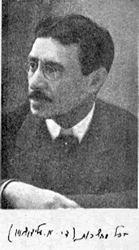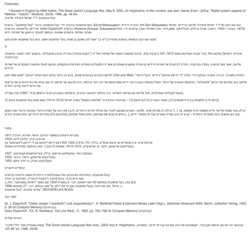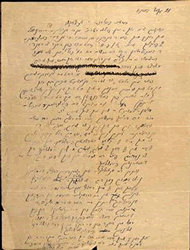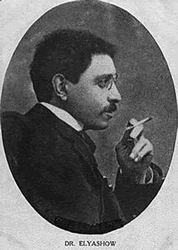Dr. Israel Isidoro Eliashib


(Yiddish: Israel Aizidar Aliashaoo , German: Isidor Eljaschoff; Russian: ??????? ?????? ???????) (1873, Kaunas - 1924, Warsaw), who was a neurologist, a publicist, a Zionist activist, literary editor and editor Newspapers hands, translator and literary critic, theater and art, considered the first visitor of Yiddish literature .
Source pseudonym narrative in Sanhedrin (nineteenth b): "They said Shimon ben Space: with thoughts of you, come with thoughts and will repay you."
T
Biography
Isidoro (Israel) Eliashib was born in Kovno, Lithuania in 1873. Studied at the KelmYeshiva with the leader of the Mussar movement of Simcha Zissel Ziv ("grandfather of Kelm") He moved to the town Grobin in Kurland. Later he studied medicine and specialized in neurology.
Eliashib, who worked in Russia, Poland and Germany, wrote about Yiddish literature Kenny - measure and aesthetic concepts that were accepted in European literature of the time, and is considered one of the leading critics of Yiddish literature.
He published reviews in various newspapers, including the written permission - German Zionist magazine "Ost und West" (Ost und West, East and West). He was also editor of the Zionist Yiddish newspaper "Di Yiddishe Stimme" (Yiddish: Jewish voice).
Eliashib translated the novel "The New Land", at Herzl's personal request. Because at that time Yiddish was the native language of the majority of European Jews, this translation of Eliashib was where most Jews read Herzl's call for the establishment of a Jewish state.
In addition to his literary contribute Eliashib was one of the pioneers of the Zionist movement, and participated in the First Zionist Congress (Basel, 1897) as a delegate from Berlin.
In the fight between Yiddishists languages and Hebrew support " language war "in Israel (1913-1914) he found himself in the middle [1]
We have two languages and a dozen other foreign languages echoes, but [...] we have only single digits. Therefore, the reader who wishes to know the course of Jewish life, to understand the spirit of the individual Jew and the Jewish community and how they find expression in Jewish literature - it does not separate to read Hebrew writers or Yiddish writers. [...] All represent our literature, all of them embody in their writing part of the Jewish life, all Jewish artists.
Writings
Reviews and Impressions (number of volumes), Warsaw: Literature, 1911.
Kritik, Kiev: Kultur - Lige, 1920.
Das South - Iidntom on pretty Yiddishe Litarator No XIX Iaraondart: a Histaris - Kritisha Stodia, Berlin: all, Trf"b 1922.
Gaklibana Sriftan, Vilnius: Sat. Srabark, 1910-1915. A collection of his writings; came later further releases:
Aontarn Rudd: Gazamlta Shriftn, Berlin: a - thoughts - Kamitat, 1927.
Gaklibana Sriftan, Warsaw: Bichar, 1929.
Gaklibana and defected, New York: Tzika, 1953.
External links
A - Thoughts, Internet edition of the Jewish Encyclopedia in Russian (Russian)
Yosef Haim Brenner, a bibliography ("Jewish Future"), Ben Yehuda Project
Nathan Goren, with thoughts (marking the 30th anniversary of his death), which, April 2, 1954 (from the book "The figures in our literature", Part II)
C. Kressel, finally remembered thoughts holder (with naming a street after Holon), which, August 27, 1958
Avishai Elbaum, "a thought", BEITARIELA'S BLOG
Written by:
Dr. J. Eljaschoff, "Ueber Jargon (" Juedisch ") und Jargonliteratur", in: Berthold Feiwel & Ephraim Moses Lilien (Hgs.), Jüdischer Almanach 5663, Berlin: Jüdischer Verlag, 1902, p. 58 (in Compact Memory) (in German)
Isidor Eljaschoff, "Ch. D. Nomberg", Ost und West, 11, 1903, pp. 763-768 (in Compact Memory) (in German)
Footnotes
^ Quoted in English by Hillel Halkin, The Great Jewish Language War, May 8, 2003, on Hagshama. In this context, see also: Itamar Even - Zohar, "Rabbi system aspects of Hebrew - Yiddish," literature, 35/36, 1986, pp. 46-54.
???-??????, ?"? ????? ??????? ??????
???-?????? (????? ????: ???-???????, ????: "?????-?????????"; ??????: ??‘??-?????????, ???? ?????? ?????? ???-????????) ??? ?? ??? ?? ?"? ????? ??????? ??????? (??????: ????? ???????? ?????????; ???????: Isidor Eljaschoff; ??????: ??????? ?????? ???????) (1873, ????? – 1924, ????), ???? ????????, ?????????, ???? ?????, ???? ?????? ????? ??????? ????, ????? ????? ?????, ??????? ??????, ????? ????? ?????? ?? ????? ?????.
???? ?? ??? ?????? ????? ??????? (?"? ?): "??? ??? ????? ?? ???: ???? ?????? ???, ???? ??? ?????? ????? ???".
?
??????? (?????) ????? ???? ???? ????? ?????? ???? 1873. ??? ?????? ???, ????? ?????? ????? ?? ???? ???? ??? ("???? ????") ?????? ?????? ????????. ????? ??? ?????, ?????? ???????????.
?????, ??? ??? ??????, ?????? ????????, ????? ??????? ?? ????? ?????? ???-???? ??????? ??????? ??? ??? ??????? ?????? ???????? ???????, ????? ???? ?????? ??????? ?? ????? ??????.
???? ??????? ???????? ?????, ??? ??? ???? ????-??? ?????? ?????? "???? ???? ????" (Ost und West, '???? ?????'). ?? ??? ?????? ?????? ????? ?????? "?? ??????? ?????" (?????: '???? ??????').
????? ??? ????? ?? ????? "?????????", ?????? ?????? ?? ????. ????? ??????? ??? ????? ????? ??? ???? ?? ??? ????? ??????, ??? ?????? ?? ????? ?? ??? ???? ????? ??????? ?? ?????? ?? ???? ?????? ????? ??????.
????? ??????? ????????, ??? ????? ?? ?????? ???????: ??? ?????? ?????? ???????, ?????? ??????? ?????? ?????? (???, 1897) ???? ??????.
???? ???? ??????? ??? ??????????? ???? ????? ?????? (?"?????????") – ???????? ????? ??? "????? ?????" ???? ????? (1913–1914) ??? ???? ???-?????? ?????:[1]
?? ??? ??? ???? ?????? ???? ????? ???? ??????, ?? [...] ?? ??? ?? ????? ???. ??????, ????? ????? ????? ?? ????? ????? ????????, ????? ?? ???? ?? ???? ?????? ??????? ?????? ??? ????? ??? ?? ?????? ????? ?????? ??????? – ???? ?? ???? ????? ?????? ?????? ?????? ?????. [...] ???? ??????? ?? ???????, ???? ???? ?????? ??????? ??? ?????? ????????; ???? ????? ??????.
?????
?????? ?????? (????? ?????), ????: ?????, ???"? 1911.
??????, ????: ??????-????, 1920.
??? ????-??????? ??? ?? ?????? ????????? ??? XIX ??????????: ? ????????-??????? ??????, ?????: ???, ???"?-1922.
????????? ???????, ?????: ?. ???????, 1910–1915. ????? ?? ?????; ???? ????? ???????? ??????:
??????? ???: ???????? ??????, ?????: ???-??????-????????, 1927.
????????? ???????, ????: ?????, 1929.
????????? ?????, ??? ????: ????, 1953.
??????? ????????
???-??????, ??????? ???????? ?? ???????????? ??????? ???? ?????? (??????)
???? ???? ????, ?????????????????????? ("????? ??????"), ??????? ?? ?????
??? ????, ??? ?????? (????? 30 ??? ?????), ???, 2 ?????? 1954 (?? ???? "?????? ????????", ??? ?)
?. ????, ??? ??? ????? ???? ?????? (?? ????? ???? ?? ??? ??????), ???, 27 ??????? 1958
????? ??????, "??? ??????", BEITARIELA'S BLOG
???? ???:
Dr. J. Eljaschoff, "Ueber Jargon ("Juedisch") und Jargonliteratur", in: Berthold Feiwel & Ephraim Moses Lilien (Hgs.), Jüdischer Almanach 5663, Berlin: Jüdischer Verlag, 1902, p. 58 (in Compact Memory) (???????)
Isidor Eljaschoff, "Ch. D. Nomberg", Ost und West, 11, 1903, pp. 763–768 (in Compact Memory) (???????)
????? ??????
^ ???? ??????? ???: ??? ?????, The Great Jewish Language War, 8 ???? 2003, ???? Hagshama. ?????? ?? ??? ??: ????? ???-???, "??????? ?? ??? ????? ?????-?????", ??????, 35/36, 1986, ??' 46–54.
----
Dr. Israel Isidor Elyashev
(1873–1924), literary critic. Bal-Makhshoves (“Man of Thoughts”; pseudonym of Isidor [Yisroel] Eliashev) was born in Kovno, Lithuania, to a wealthy family. His father, Shloyme Zalkind Eliashev, had been a maskil in his youth, but after marriage reverted to religion, becoming an adherent of the Musar Movement. The dim, penitential sermons Bal-Makhshoves attended with his father as a child filled him with “gloom and terror,” stamping his personality with the pervasive melancholy that characterized him as an adult. This piety, however, was offset in the household by an open attitude to the learning of French, German, and Russian. At age 10, Bal-Makhshoves was sent to the Musar yeshiva in Grobin, from which he was expelled for heretical tendencies some two years later. A year or so afterward, his parents made the surprising decision to send him to high school in Switzerland.
Eliashev went on to study medicine and biology at the universities of Heidelberg and Berlin, qualifying as a doctor. His contact with Jewish student groups in the latter city led him to espouse the Zionism of Theodor Herzl, a cause to which he remained faithful. He made his literary debut in articles published in German and Russian in the mid-1890s. His first Yiddish literary piece, a feuilleton of slight value, was published in a Romanian journal in 1897. Bal-Makhshoves only took up serious Yiddish writing in 1899 at the urging of Yoysef Lurie, editor of the Warsaw weekly Der yud.
In 1901, Bal-Makhshoves returned to Warsaw after 15 years in the West. He practiced medicine only intermittently, devoting himself mainly to Yiddish belles lettres. Within several years, his regular articles in Der yud and other Yiddish periodicals made him the leading Yiddish literary critic of the day. From about 1910 on, however, he struck an increasingly pessimistic tone; in correspondence from this period he despairs of the present and future of modern Yiddish culture. This pessimism may have been partially due to his depression, exacerbated by the collapse of his marriage to a much younger woman. The World War I years marked a hiatus in his literary activity; the Yiddish press was banned in Russia in 1915 and Bal-Makhshoves was mobilized as a military doctor. In the postwar years his mood seems to have lifted and he resumed his literary activity with gusto. Returning to Berlin in 1921, his morale was much boosted by the widespread acclaim accorded him on the twenty-fifth jubilee of his literary activity celebrated in the city on 14 July 1923. Shortly thereafter, however, his chronic physical and psychological ailments took a turn for the worse and he returned to Kovno, where he died.

From Bal-Makhshoves in Kaunas, Lithuania, to Yoysef Opatoshu in New York, n.d. He thanks Opatoshu for sending him his novel In poylishe velder and the anthology of his some of his other works, and says that the novel is now being passed around. Dovid Bergelson is the first to have read it and talks every evening about what an impression it has made on him. Bergelson is going to review it for Bal-Makhshoves's Yudishe shtime. About Opatoshu's suggestion that they form a Peretz Society, he can't yet say anything. All the locals are still "too exhausted" to take on something like this, but he expects that in a few weeks they might be in better shape to consider it. A poet, Leyb Kvitko, is helping Bal-Makhshoves edit the "anthology." "I'm sure you have some idea how people, even literati, who come from the Soviet Union, throw themselves on books, all but ripping them out of your hands, and then tirelessly gulping them down." Yiddish. RG 436, Joseph Opatoshu Papers, F32. (YIVO)
The most significant of Bal-Makhshoves’s earlier writings were published in the five volumes of his Geklibene shriftn (Collected Writings) between 1910 and 1915. The initial two volumes were actually the first works of Yiddish literary criticism ever to be published. The majority of his later literary and critical writings were never issued in book form. Bal-Makhshoves’s publicistic essays, written between 1915 and 1923, were published posthumously in a book titled Untern rod (Under the Wheel; 1927). In 1953, an anthology of his works, Geklibene verk (Collected Works), was published in New York; this collection includes autobiographical essays that had never appeared in book form. In addition to his original writings, Bal-Makhshoves translated a number of works of European literature to Yiddish, including Herzl’s Altneuland, Turgenev’s Fathers and Sons, and Tolstoy’s Cossacks.
Bal-Makhshoves’s unusually polarized biographical background left a deep imprint upon his critical works. He himself stated, “In Warsaw, among the Polish Jews, I made my entrance like a man from a foreign people with a high culture (no small thing—a Berlin doctor, who had lived in Western Europe for 14 or 15 years). I studied them like the Aztecs; but they were close to me like children born of one father” (“25 yor literatur,” in Geklibene verk, p. 33). Characteristic of this insider–outsider stance is the first pseudonym he adopted for his Yiddish writings, Ger Tsedek (Righteous Convert); the pseudonym Bal-Makhshoves, by which he became well known, was bestowed upon him later by the editor of Der yud.
Bal-Makhshoves’s critical works are colored by a strong autobiographical investment; he seeks via Yiddish language and literature to recapture the environment from which he became estranged. Heavily influenced by Hippolyte Taine’s notion of literature as reflective of “race, environment, epoch,” Bal-Makhshoves was thus drawn considerably to those writers most steeped in the patriarchal past and in whose work is reflected the collective psychology of the folk—most notably Sholem Yankev Abramovitsh (Mendele Moykher-Sforim). As was true of Abramovitsh, however, Bal-Makhshoves’s purview of traditional Jewish life in Eastern Europe was profoundly ambivalent; nostalgic longing goes hand in hand in his writing with expressions of revulsion toward the backwardness, provincialism, and religious fanaticism he attributed to this culture.
Bal-Makhshoves defined his own method as “national criticism.” He attributed vital importance to the Yiddish language itself as an antidote to assimilation and a repository of the wellsprings of the Jewish collective soul. A romantic populist, he believed that the alienated Jewish intelligentsia of his day should be educated, through immersion in Yiddish, by the folk rather than vice versa. He took upon himself the role of apostle of nascent national literature in Yiddish, aspiring to create an informed Yiddish readership both from the ranks of the intelligentsia and from the folk. Refusing, however, to align himself with either side in the dispute between Hebraists and Yiddishists, he advocated a harmonic coexistence of Hebrew and Yiddish as twin branches of a unitary national literature. Bal-Makhshoves was the forerunner of the sociopsychological approach to Yiddish literature, reading a work as expressive of the ills and strengths of the national psyche. In this respect, his influence cannot be underestimated: Yiddish literary criticism of all ideological persuasions was to follow, by and large, the path he had blazed.
Particularly prescient and far-reaching in influence was Bal-Makhshoves’s appraisal of Sholem Aleichem. The first critic to take Sholem Aleichem seriously, Bal-Makhshoves arrived at a penetrating psychological explanation of the spell this writer cast upon his readership. Sholem Aleichem, he writes, “transforms our real life into a dream. Thanks to his free laughter our real world becomes transformed into a cock-and-bull story (bobe mayse)” (Geklibene shriftn, vol. 1, p. 93). Building his essay on the polarities of Jewish life as represented by Tevye the milkman on the one hand, and Menakhem Mendl on the other, Bal-Makhshoves exposes the nightmarish reality that underlies Sholem Aleichem’s comedic metamorphosis of exilic Jewish life. Bal-Makhshoves sees Menakhem Mendl as a horrific embodiment of the lunatic dynamism of the East European Jewish petty trader and luftmentsh in the period of transition to capitalism. While he is more sympathetic to Tevye, he finds the latter’s congealed stasis, his solipsistic, purblind attitude to the modern world as disturbing as Menakhem Mendl’s headlong dive into modernity.
The polarization of Menakhem Mendl and Tevye as national archetypes, initiated in that essay, recurs in almost every later critical treatment of Sholem Aleichem of every ideological stripe. Consideration of Sholem Aleichem leads Bal-Makhshoves to the direst assessment of the life of the Jewish masses in the Diaspora, which “repels every healthy man. . . . They live like a worm reared in the gutter of a roof which then falls off the roof into a street-drain, but perforce then acclimatizes itself to its new environs” (Geklibene shriftn, vol. 1, p. 103).
While he did not write Hebrew pieces (though his Yiddish essays, in translation, appeared in Hebrew periodicals), Bal-Makhshoves’s literary criticism treats Hebrew works quite extensively. Aside from his Sholem Aleichem essay, it is Bal-Makhshoves’s longer, synthetic pieces that have best stood the test of time.
Suggested Reading
Y. Kharlash, “Bal-Makhshoves,” in Leksikon fun der nayer yidisher literatur, vol. 1, cols. 359–366 (New York, 1956); Nokhem Minkoff, Zeks yidishe kritiker (Buenos Aires, 1954), pp. 227–290; Samuel Niger, Geklibene shriftn, vol. 2, Lezer, dikhter, kritiker (New York, 1928), pp. 495–565.
Author
Marcus Moseley
yivo
Moissei Eljaschoff
From Wikipedia,
Moissei Zacharowits Eljaschoff (24 June 1870 – 1919) was a Lithuanian chess master, He was the older brother of Dr. Israel Isidor Elyashev, the first Yiddish literary critic.
He won a match against Carl Carls (3 : 1) at Berlin 1902.[1] He tied for 3rd-6th at Hanover 1902 (the 13th DSB Congress, Haupturnier B, Leo Fleischmann won), took 2nd behind Hans Fahrni at Coburg 1904 (the 14th DSB Congress, Haupturnier B), took 3rd at Munich 1904 (Quadrangular, Rudolf Spielmann won), tied for 3rd-5th at Munich 1906 (Hexagonal, Aron Nimzowitsch won), took 13th in the Ostend 1907 chess tournament (Hauptturnier B, Georg Schories won).
His best achievement was the 2nd place, behind Friedrich Köhnlein, at Düsseldorf 1908 (the 16th DSB Congress, Haupturnier A). He shared for 4th at St. Petersburg 1909 (Alexander Alekhine won), tied for 5-6th at Hamburg 1910 (the 17th DSB Congress, Haupturnier B), took 20th at St. Petersburg 1911 (Stepan Levitsky won), tied for 7-8th at Breslau 1912 (the 18th DSB Congress, Haupturnier A, Bernhard Gregory won), took 17th at Vilna 1912 (Haupturnier A, Karel Hromadka won), and tied for 17-18th at St. Petersburg 1913/14 (All-Russian Masters' Tournament, Alekhine and Nimzowitsch won).[2]
References
^ http://www.thechesslibrary.com/files/ShortMatchesOf20thCentury.htm
^ http://www.anders.thulin.name/SUBJECTS/CHESS/CTCIndex.pdf Name Index to Jeremy Gaige's Chess Tournament Crosstables, An Electronic Edition, Anders Thulin, Malmö, 2004-09-01
Eljaschoff was born at Krustpils, Latvia and hence was Latvian, not Lithuanian - source: Chess Personalia by J. Gaige.
External links
Moissei Eljaschoff at 365Chess.com
Dr. Israel Isidor Elyashev (1873–1924)
Israel Isidor Elyashev
Dr. Israel Isidor Elyashev was a Jewish neurologist and the first Yiddish literary critic. He introduced the world to the works of the great contemporary Yiddish classical writers: Sholem Rabinovich, better known as Sholem Aleichem, Mendele Mocher Sefarim, Isaac Leib Peretz and Nachum Sokolov; along with modern Hebrew writers including Chaim Nachman Bialik, and Sholem Asch, among several others.
Elyashev was originally from Kaunas, Lithuania. In his youth, he studied with Rabbi Simcha Zissel Ziv at the Talmud Torah in Grobi?a, Latvia, but was eventually expelled from the school for his "heretical tendencies."[1] He went on to attend a high school in Switzerland, and he then studied medicine and biology in Heidelberg and Berlin.
Elyashev's pen name was Bal-Makhshoves (Hebrew: ??? ??????), meaning "Master [of] Thoughts" or "The Thinker".
Elyashev is best known for his work as a literary critic, writing in Yiddish. He translated Theodor Herzl's Altneuland from German into Yiddish, upon Herzl's personal request. His Yiddish translation of Herzl's work is the language that by far- most of European Jewry had read of Herzl's calling for a Modern Jewish State.
His attitude to Jewish literature, Yiddish, and Hebrew is summed up by something that he wrote in 1918:
[W]e have two languages and a dozen echoes from other foreign languages, but… we have only one literature. And therefore the reader who seeks to become acquainted with the currents of Jewish life, to comprehend the spirit of the Jewish individual and multitude and how they find expression in Jewish literature, that reader does not separate Hebrew writers from Yiddish ones. …All are representatives of our literature, all embody a piece of Jewish life in their writings; all of them are Jewish artists.[2]
Elyashev was also politically active, as a forerunner of the Zionist Movement. He participated in the First Zionist Congress, held in Basel, Switzerland in August 1897, as a delegate from Germany .
External links
Bal-Makhshoves, YIVO Encyclopedia of Jews in Eastern Europe
Notes
^ Bal-Makhshoves, YIVO Encyclopedia of Jews in Eastern Europe
^ The Great Jewish Language War at www.hagshama.org.il
